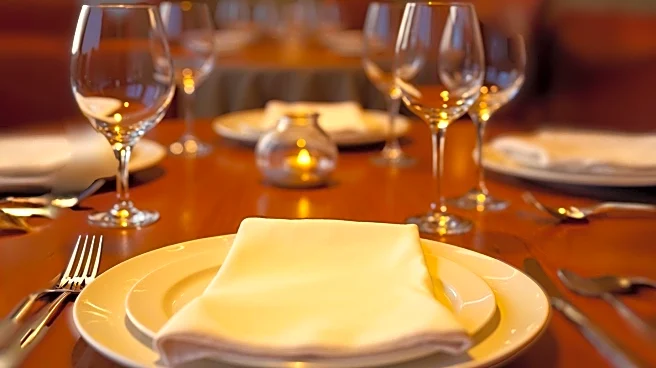What's Happening?
Barbouzard, a new restaurant located on K Street NW in Washington D.C., has opened its doors, offering a dining experience inspired by the French Riviera. The restaurant is led by veteran chef Cedric Maupillier, known for his previous work at Convivial in Shaw. The establishment aims to provide a glamorous escape with a menu featuring French-Mediterranean dishes. The restaurant's name, Barbouzard, is rooted in French slang, meaning 'secret agent,' and reflects the city's sense of power and intrigue. The restaurant launched with a cocktail party on July 14, marking a year since Maupillier and managing partner Nasr El Hage met at a Bastille Day party at the French Embassy.
Why It's Important?
The opening of Barbouzard adds a new dimension to the D.C. dining scene, offering residents and visitors a taste of the French Riviera. This development is significant as it highlights the city's growing culinary diversity and the demand for unique dining experiences. The restaurant's focus on luxury dining, with dishes like foie gras and caviar, caters to a clientele seeking high-end culinary options. Additionally, the restaurant's location in the Golden Triangle business district positions it as a potential hotspot for business lunches and upscale dinners, contributing to the local economy and cultural vibrancy.
What's Next?
Barbouzard plans to continue expanding its offerings, with future brunch services and 'After Dark' events featuring DJs on Friday and Saturday nights. The restaurant aims to become a dining destination in D.C., attracting both locals and tourists. As the establishment gains popularity, it may influence other restaurants to explore similar themes and upscale dining experiences. The success of Barbouzard could also encourage further investment in the city's culinary scene, enhancing D.C.'s reputation as a food destination.
Beyond the Headlines
The opening of Barbouzard during challenging economic times raises questions about the role of luxury dining in society. Restaurants like Barbouzard serve as places of restoration and enjoyment, providing a sense of normalcy and escape amidst broader societal issues. The emphasis on high-end dining experiences may also reflect cultural shifts towards valuing unique and memorable culinary moments, even in times of economic uncertainty.









